“This isn’t Metropolis…this isn’t the city of tomorrow…it’s Gotham,and if you want to see what that means, just check out your squad room”-Gotham Central #7
Superheroes tend to be subversive of law enforcement. Aside from the illegality of vigilantism, it’s difficult to have much respect for a a moderately trained guy with pistol when compared to a billionaire genius ninja detective. Despite this, most superheroes since the induction of the comic code have had genial relations with law enforcement. It helps that superheroes rarely target “mundane” crime. Superman’s enemies tend to be as strong as he is; the X-men stick to “mutant crime” and so on. Despite this, Batman works with the police. Or really, I should say a single policeman: Commissioner Gordon. Mostly because Gotham cops are fucking dicks. Most “gritty” iterations of the franchise portray the police as at best impotent and at worst, as bad as Gotham’s criminals. This element is prevalent enough to even be present in video games such as MMORPG DC Universe Online, where Gotham cops are enemies to hero players.
The GCPD’s corruption makes sense for a few reasons. For one, the Batman franchise derives heavily from film noir, a genre with cynical attitudes towards humanity and fate. Even the police can’t be relied upon in the genre; in Frank Miller’s Sin City, every character, no matter their alignment, is wary of the police.
Sin City: The Big Fat Kill #3 1995
In addition, Batman fights predominantly “normal” people (at least by comic book standards), who the cops should be able to handle. Law enforcement has to be ineffectual in order to justify the need for a Batman. Sometimes they’re just incompetent; Tim Burton’s Batman had a Commissioner Gordon who was nothing more than a face for the police (the guy wears fucking tuxedos to busts).
Batman (1989)
Incompetent cops just aren’t enough to get across the dramatic weight of Batman’s quest. Giving the city a culture that enforces crime allows for an even bleaker Gotham to save. This is most prevalent in Batman: Year One (1987), Frank Miller’s origin story that details the beginning of Bruce Wayne and James Gordon’s careers. We see through Gordon’s introduction that calling the GCPD corrupt would be an understatement…
The Commissioner even implies that he wants officers who are dirty.
As you could see, Frank Miller tends to veer towards the “extreme” side of police corruption where everyone is as evil as possible. This isn’t totally ridiculous; LA’s infamous “Rampart scandal” in the 90’s involved a branch of the police called C.R.A.S.H. who literally REWARDED murder and evidence tampering with commendations. In Dekalb County Georgia, corrupt sheriff Sidney Dorsey assembled a group of cops to pose as gang-bangers in order to assassinate his political rival Derwin Brown, showing that even those at the top can be as corrupt as Gotham’s ex-commissioner.
Despite Frank Miller’s extreme depictions, Batman:Year One was considered canonical by DC Comics, meaning that all of the events “really” occurred in continuity. So Gotham’s previous police department ordered a hit on a newborn, blew up a tenement with civilians in the vicinity, and casually beat up teenagers on the street. Holy shit. Miller definitely went with the amoral cops route for police corruption, which works well for his “dark and edgy” stories, but has several unfortunate implications. In Metropolis, we can at least assume that the police department works in the favor of the people’s interest (as one would like to assume of most law enforcement), meaning that we can trust the local government by extension, and thus we can trust the city itself. If Gotham’s cops are corrupt, and its government is corrupt, then the CITY itself is, by default, corrupt. And if that’s true,why should anyone care if it gets saved? As with most superhero works, there are no “normal” people to care about, just heroes and villains. If the police are bad guys too it almost makes Batman’s quest silly (well, silli-er). It’s no wonder why so many antagonists seem to suggest just destroying Gotham; what Ra’s Al Ghul, Joker, and Bane all seem to agree on in the Nolan trilogy is that crime is inherently systemic. It begins from the top and ends at the bottom in the slums of Gotham. Until the police are reformed, the city can’t improve.
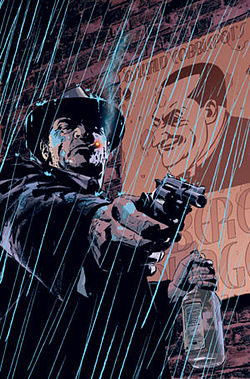 One way to alleviate the unfortunate implications of Gotham’s corruption is by showing that the police force, even when misconducting themselves, have the best intentions. The biggest canonical kinda dirty/kinda good cop in the franchise is Detective Harvey Bullock (to the left). In case you’re wondering, he’s that fat cop in the animated series who’s kind of a douche. In comics, he’s probably the closest thing you get to a sympathetic corrupt cop. He takes bribes, but other cops trust him. He allows a attempted murder suspect’s identity to leak to the mafia, but that’s to avenge Commissioner Gordon. He has ties to the organized crime but uses it to gain info on crimes. He’s complicated.
One way to alleviate the unfortunate implications of Gotham’s corruption is by showing that the police force, even when misconducting themselves, have the best intentions. The biggest canonical kinda dirty/kinda good cop in the franchise is Detective Harvey Bullock (to the left). In case you’re wondering, he’s that fat cop in the animated series who’s kind of a douche. In comics, he’s probably the closest thing you get to a sympathetic corrupt cop. He takes bribes, but other cops trust him. He allows a attempted murder suspect’s identity to leak to the mafia, but that’s to avenge Commissioner Gordon. He has ties to the organized crime but uses it to gain info on crimes. He’s complicated.
Strangely enough, despite being quite a staple of the franchise, Bullock doesn’t appear in media outside of the comics and the animated series but is represented by characters who are pretty much the same person. His representatives in the Batman films are decidedly less morally ambiguous. In 1989’s Batman, his stand-in Detective Eckhardt accepts bribes from criminals and attempts to murder the same guys in order to stay out of trouble. In Batman Begins (2005), his stand-in Detective Flass (who for some reason has the name of the guy from Batman: Year One) is just as corrupt. I guess Bullock just looks so unsavory due to his fatness and manner that most adaptations just make him dirty to contrast with Gordon. In addition, comic writers can’t seem to decide if he has good intentions or is just corrupt. The is probably because, no offense to them, most comic writers aren’t capable or willing to get across the conflicts of being an ACTUAL crime fighter. The series Gotham Central goes in this direction, basically turning the Bat mythos into Dragnet with real cops interacting with the rogues gallery the way real cops would. Police misconduct is portrayed in reasonable degrees as opposed to extremes.
Gotham Central #15
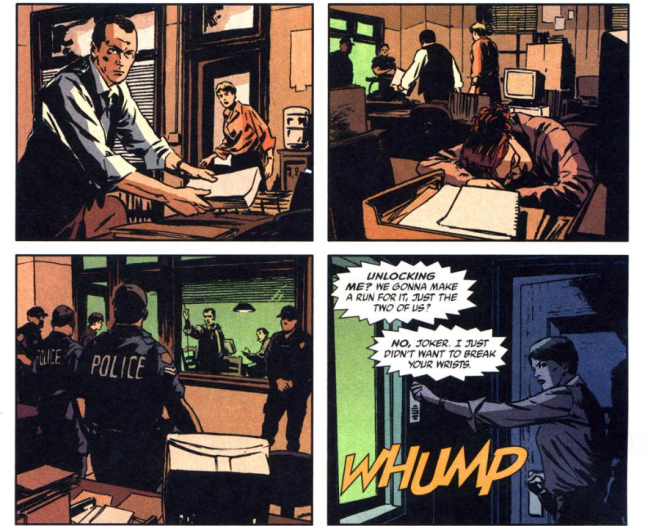
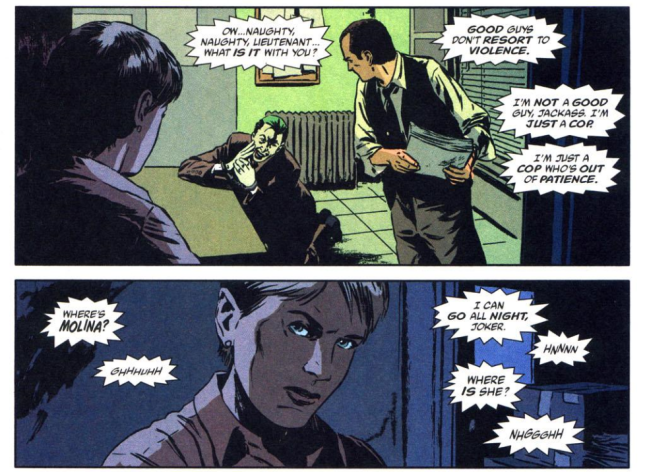 Sometimes cops have to break the rules in order to get a job done. Sometimes cops just run out of ideas. While these methods aren’t always the best, they are human responses to often difficult scenarios. In the world of Gotham Central, normal cops have to go against men like Mr. Freeze and the Joker, people way outside of their pay-grade. It would be hard to conceive of how would one deal with such threats without being forced or compelled to go outside the line.
Sometimes cops have to break the rules in order to get a job done. Sometimes cops just run out of ideas. While these methods aren’t always the best, they are human responses to often difficult scenarios. In the world of Gotham Central, normal cops have to go against men like Mr. Freeze and the Joker, people way outside of their pay-grade. It would be hard to conceive of how would one deal with such threats without being forced or compelled to go outside the line.
Arguably, the best commentary on police misconduct in Gotham is the character Deputy Commissioner Peter Foley in The Dark Knight Rises (2012), played by Matthew Modine (who oddly enough WASN’T a character from the comics). Remember how I said a cop has to be either corrupt or stupid in order to make Batman look good? Well he manages to do both to a realistic degree.
Foley is introduced talking to Gordon at a high-class party, where Foley tries to convince him to pay attention to crime statistics, which Gordon rejects in favor of his “gut” feelings. He also suggests that he talks to the mayor, which Gordon also dismisses by saying that’s Foley’s department. We get some quick distinctions here between the two: Gordon is more concerned with crime on a personal level that goes beyond statistics, which is all Foley knows about. Gordon doesn’t care about political maneuvering whereas Foley relishes it. If Gordon is the “good cop” than Foley is by default the “bad cop”. He’s not evil at all, only his aims have been “corrupted”. Rather than focusing on public service, he’s more concerned with personal glory. For example, when Batman appears, his main interest is one-upping Gordon to make himself look good by catching him, rather than containing the more immediate threat of Bane’s gang. His lack of “good cop” goals seems to affect his competency as well; when Blake is introduced as another “good cop”, his passion for the job allows him to believe fellow good cop Gordon’s story about soldiers in the sewers, which Foley of course scoffs at. Blake also manages to connect corrupt Wayne Industries board member Roland Daggett to Bane through ambitious detective work, which Gordon implies Foley was supposed to do, but clearly failed. Foley’s lack of “good cop-ness” comes to a head after Bane’s takeover, where he flat out decides to not get involved with the plan to save his fellow officers. Up until this point, the guy seems like a lost cause…until Batman returns to Gotham.
Eventually, we see the effect the symbol had on Foley during the siege on Bane’s troops, when Foley not only joins the cops, but leads them in full uniform.
Foley dies doing his duty. The film never elaborates why the symbol of Batman meant so much to Foley then when it didn’t mean anything before, perhaps it was something akin to a “spiritual rebirth” that born-again Christians often allude to. While this could easily be chalked up to sentimentality (and it definitely is), that doesn’t take away from the fact Foley, a cop who seemingly had no more “good cop” left in him, was redeemed by the hope Batman brought. He became a “born-again officer”. In a “realist” scenario that Nolan claims the films take place in, Batman is just a man. He can beat up bad guys but he can’t fight crime alone. As Bruce Wayne postulates in Batman Begins: “People need dramatic examples to shake them out of apathy”. For the police officers of Gotham, that meant inspiring them to risk their lives to save their city. This is in stark contrast to The Dark Knight (2008), where many police officers are said to have been in the pocket of organized criminals which culminated in the fall of Harvey Dent. The last film left us with a disturbing view of the GCPD, but this film manages to redeem them along with Foley. The cops retaking of Gotham and Foley’s sacrifice shows what makes Batman (and the superhero in general) such a resonant character: he makes us want to be better.
For commentary on the questionable morals of Batman himself:
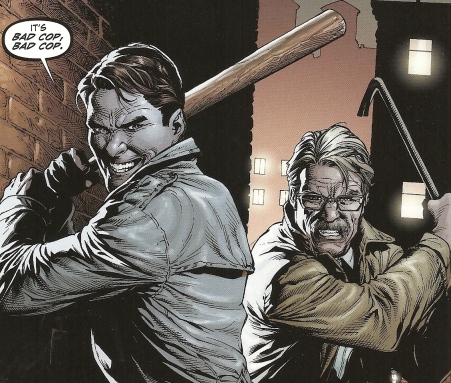
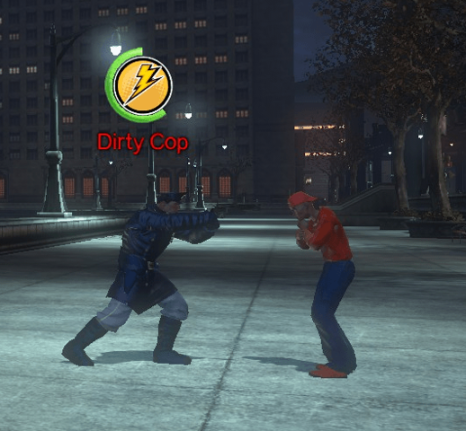
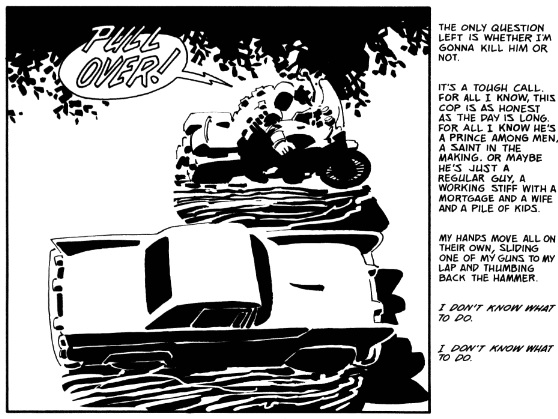
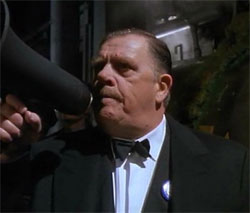
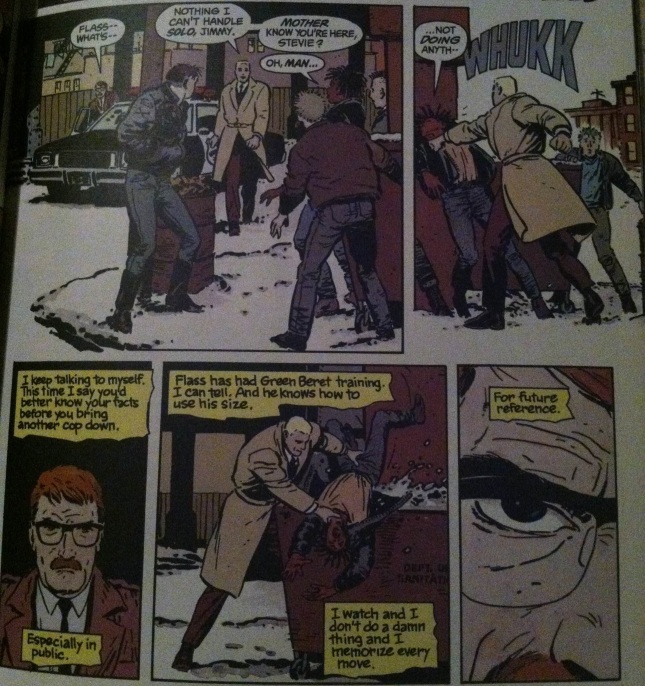
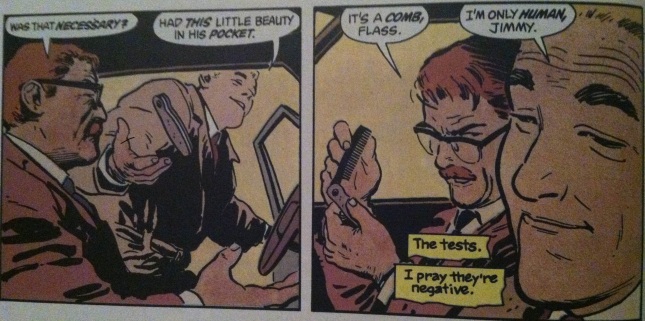
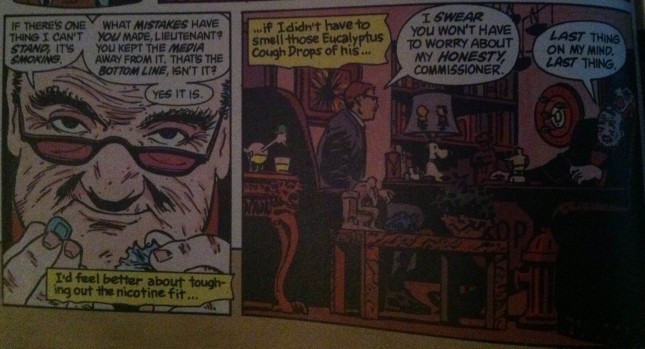
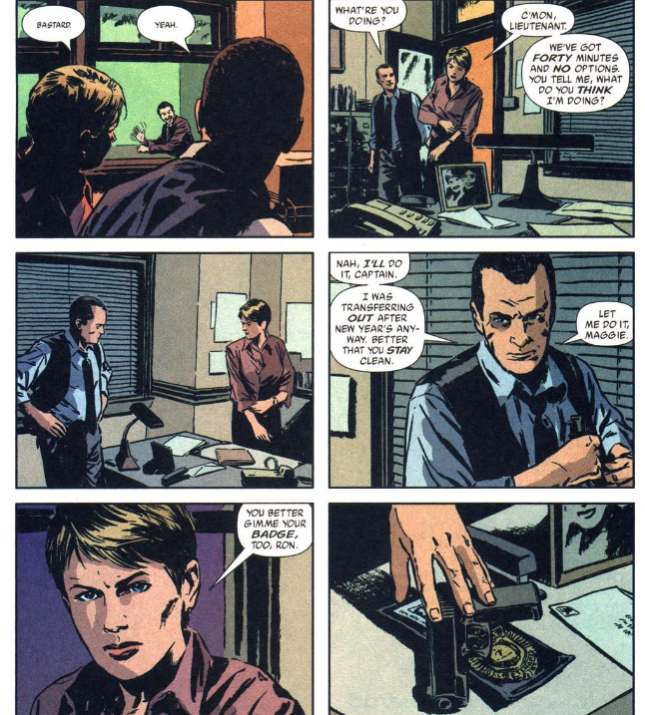
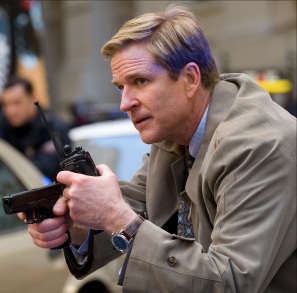
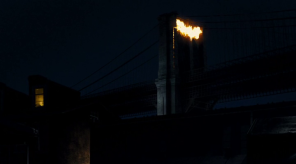
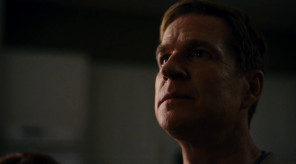
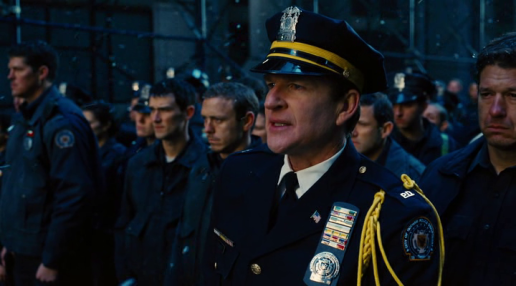
Pingback: Batman as a Heroic Psychopath | World Within Logos
Pingback: Ben Affleck As Batman: Why So Serious? | World Within Logos
Pingback: Flash:The Quintessential Superhero | World Within Logos
Pingback: From Comic to TV:Green Arrow as Adapted Into CW’s “Arrow” | World Within Logos
Pingback: Iron Man: Real American Hero | World Within Logos
Pingback: Three Forms Of Comedy As Seen Through Justice League | World Within Logos
Pingback: The Lois Lane Effect | World Within Logos
Pingback: Superman as Defined by Lex Luthor | World Within Logos